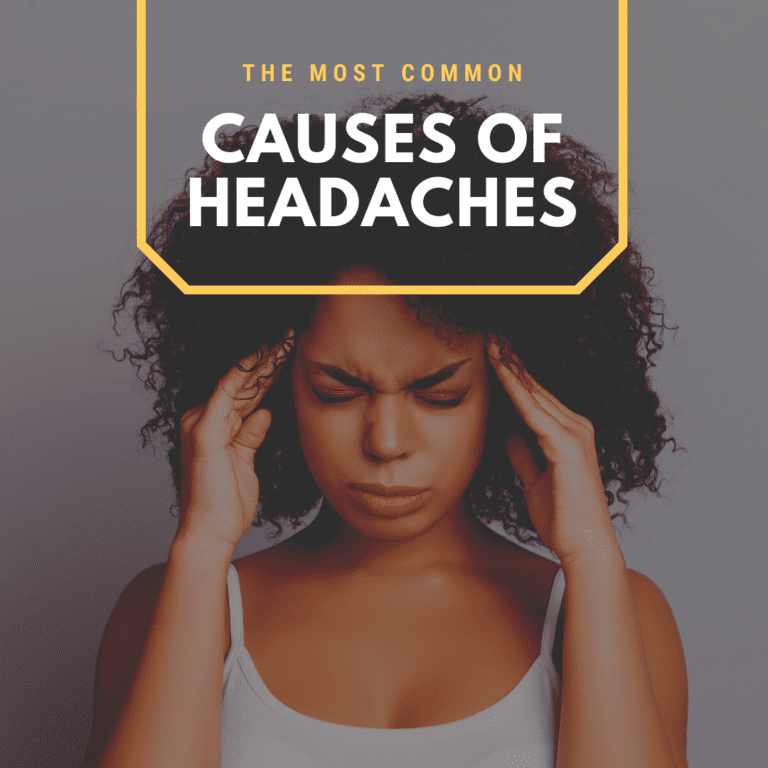Do you often get headaches? If so, you’re not alone. In fact, headaches are one of the most common medical complaints in the world. There are many different types of headaches, and each one is caused by a different set of factors. In this blog post, we will discuss the most common causes of headaches and how to prevent them from happening.
What is a headache?
Before getting into the specifics of what can cause a headache, it is important to know what a headache actually is. A headache can be described as pain in the head, face, or upper neck region. The term “primary headache” refers to any type of headache that does not originate from another medical condition (such as an injury). On the other hand, the term “secondary headache” refers to a headache that is caused by an underlying cause.
Types of headaches
There are many different types of headaches, and each one has its own unique set of causes. Here are some examples:
Tension Headaches – The most common type of primary headache, tension-type headaches usually feel like they have a band of pressure around the head. They can be caused by stress, anxiety, poor posture, and other lifestyle factors.
Migraines – Migraines are another common type of primary headaches. They are often accompanied by throbbing pain on one side of the head, nausea, vomiting, and sensitivity to light or sound.
Cluster Headaches – Cluster headaches are a rare type of primary headache that typically affects men more than women. They are characterized by severe, stabbing pain on one side of the head and can occur in clusters (hence the name).
Sinus Headaches – Sinus headaches are secondary headaches caused by inflammation or infection of the sinuses. They are typically accompanied by pain in the forehead, cheeks, and around the eyes.
Common Headache Causes
Once you have determined the type of headache you are experiencing, then you can start to narrow down the cause. Primary headaches can have a variety of causes, including:
Alcohol

Alcohol is a common headache trigger and different types of alcohol can be more triggering than others. For example, red wine and beer are more likely to cause headaches than white wine or spirits.
Caffeine
Although many people use caffeine to treat their headaches, it can also be a common trigger for them as well. If you’re someone who regularly drinks coffee or tea before bedtime, try having an herbal tea instead (or just quit drinking caffeinated beverages altogether).
Certain Foods
Certain types of foods can also trigger headaches. One common example is processed meats with nitrates. These include bacon, hot dogs, and deli meats. Chocolate is another common headache trigger that some people are sensitive to.
Dehydration
When you’re dehydrated, your body doesn’t have enough water to function properly. This can lead to a variety of health problems, including headaches. Try drinking more water throughout the day and see if it helps with your symptoms. On average, it is recommended to drink 8 8 oz. glasses of water a day.
Hormonal Changes
Many women experience headaches before or during their menstrual periods due to the fluctuating levels of hormones in their body at this time. Some headaches may also be caused by menopause or pregnancy-related changes in hormones.
Medications
Certain medications can also cause headaches, such as birth control pills or other hormonal contraceptive methods. If you have been taking a new medication and started to experience headaches shortly after starting it, then this may be the cause of your symptoms.
Lack of Sleep
Not getting enough sleep is a common headache trigger. Most people need around eight hours of sleep per night.
Poor Posture
Bad posture can increase the tension in your neck and shoulders, which can lead to headaches.
Stress and Anxiety
Both stress and anxiety can be major triggers for headaches. If you find that you often get headaches during times of stress, try to find ways to relax and de-stress such as yoga, meditation, or deep breathing exercises.
Secondary headaches have a whole different set of causes. Here are some common ones:
- Infection or inflammation of the sinuses (sinusitis)
- A sudden drop in blood pressure (hypotension)
- High blood pressure (hypertension)
- Infection or inflammation of the eyes (conjunctivitis)
- A head injury, such as a concussion
- Bleeding in and around the brain (subarachnoid hemorrhage)
- Illness
- Dental problems
- Stroke
Preventing headaches

There are many different things that can cause a headache, but there are also many ways to prevent them from happening. Here are some tips:
Get enough sleep – Most people need between seven and eight hours of sleep per night. If you’re not getting enough sleep, it can lead to tension headaches.
Avoid stress and anxiety – Stress and anxiety are two of the most common causes of tension headaches. If you’re feeling overwhelmed, take a few minutes to relax and unwind.
Stay hydrated – Dehydration is a leading cause of migraines. Make sure to drink plenty of water throughout the day.
Exercise regularly – Exercise is a great way to relieve stress and tension. It can also help improve your overall health and well-being.
Avoid Triggers – Some people notice specific things that trigger their headaches. If you notice that certain things make your headaches worse, try avoiding them.
Improve Your Posture – Make sure you’re sitting and standing up straight in order to take excess strain off of your neck and shoulders. This can reduce headaches from poor posture.
In Conclusion
If you’re experiencing frequent headaches, it’s important to see a doctor for diagnosis and treatment. Headaches can be caused by many different factors, so it’s important to find the root cause of your headaches. While following our prevention tips can reduce the likelihood of getting a headache in the future, you may still benefit from seeing a neurologist for your headaches. Only a neurologist will be able to accurately diagnose the cause of your headaches and recommend an effective treatment plan.

Dr. Kashouty, a diplomate of the American Board of Psychiatry and Neurology (ABPN), practices general neurology with fellowship trained specialization in clinical neurophysiology. Dr. Kashouty finds the form and function of the nerves and muscles the most interesting part of neurology, which is what led him to specialize in neurophysiology with more emphasis on neuromuscular conditions. He treats all neurological diseases, but his main focus is to treat and manage headaches, movement disorders and neuromuscular diseases.




